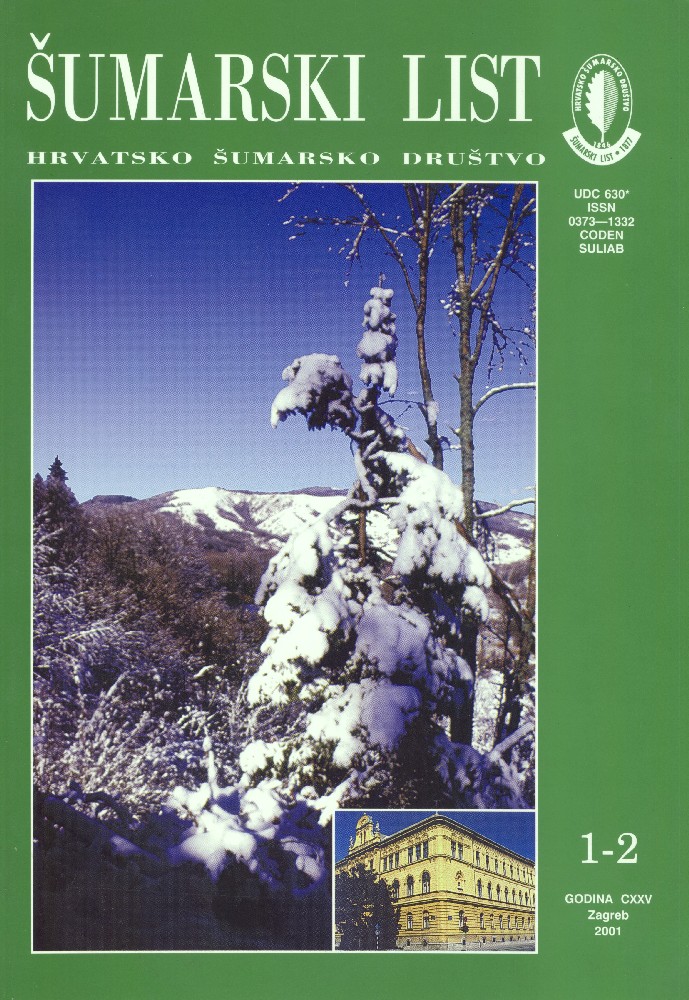
broj: 1-2/2001
pdf (31,0 MB) |
|
||||||||||||||
| IZVORNI ZNANSTVENI ČLANCI | ||
| Lukić, N. | UDK 630* 561 +182.2 (Fagus sylvatica L.) | |
| Dendroclimatology Analysis of Common Beech (Fagus sylvatica L.) on Papuk pdf HR EN | 3 | |
| Božić, M., Čavlović, J. | UDK 630* 622 + 624 + 522 (001) | |
| The Relationship Between Dominant Height. Dimension of Crop Maturity and Normal Growing Stock in Selection Stands pdf HR EN | 9 | |
| Franjić, J., Škvorc, Ž., Čarni, A. | UDK 630* 188(001) | |
| Numerical Analysis of Phytosociological Releves in Beech-Fir Forests (Abieti-Fagetum s. l.) in Croatia pdf HR EN | 19 | |
| Šajković, A. | UDK 630* 120 +UDK 301.153 (001) | |
| The Influence of the Quality of Life on Ecological Alttitude pdf HR EN | 27 | |
| Summary: Empirical research was conducted on a sample of 747 respondents in natural sciences (students of the Faculty of Forestry, Electrical engineering, employed forestry engineers and omployed engineers of wood technology). The respondents answered three value scales describing their attitude towards nature, towards development and towards forests through their own assessment of the quality of life.According to research results, there are different ecological orientations in dependence on a subjective assessment of the quality life. The fifth category of the respondents showed a tendency towards technically oriented values (“We live much better than others”). This group of respondents also displayed a tendency towards naturalism and the limited nature of oil reserves, then towards forests as a source of maximal financial benefit, while it rejected sustainable development. The respondents in the second and third categories, or the average and sub-average share of the sample, showed a favourable attitude towards sustainable development. The first group of those questioned showed the smalles degree of inclination towards naturalism (“We live much worse than others”). This group also showed little agreement with oil reserved and care for forests and rejected sustainable development. The data show that the respondents’ answers to certain problems associated with nature and environment were closely linked to the quality of life. Accordingly, those respondents whose live quality is much better and above average than that of others, had a positive attitude towards techical values, accepted naturalism and showed concern for energy sources. They rejected sustainable development, probably because of their tendency towards exponential growth, which was shown in the statement about maximal financial benefits from forests. The respondents who quality of life is much worse and below average, did not show an inclination towards naturalism or any concern for forests and oil sources. They also rejected sustainable development. It can be concluded that this group of respondents is much more oriented towards exponential growth, that is, towards full and limitless development. This is based on the assumption that those with the worst quality of life need absolutely everything regardless of nature. In other words, the economic situatuon absolutely dominates ecological problems. In contrast to these extremes in the sample, the respondents in the category “We live like the majority of others” showed the highest degree of acceptance of sustainable development compared to the respondents in the first category. They also accept naturalist orientation and believe that we should all care for the survival of forests in equal measure. A very low level of acceptance was shown at maximal financial benefits from forests, which means that they did not accept exponential growth. To sum up, it can be said that the probability of accepting naturalism and sustainable development as an orientation is linked, among other things, with the way and quality of life. | ||
| PREGLEDNI ČLANCI | ||
| Sabadi, R. | UDK 630* 904 | |
| Portugal, a Brief Note on its Forestry and Forest Industries pdf HR EN | 35 | |
| Antonić, O. | UDK 630* 181 + 181.3 | |
| Is the Pedunculate Oak species of Climatogenic Distribution in Croatia? pdf HR EN | 45 | |
| STRUČNI ČLANCI | ||
| Dimitrov, T. | UDK 630* 432 | |
| The Conclusion of the Croatian Government and the Proposal of Preventive Forest Fire Protection Programme in the Republic of Croatia pdf HR EN | 57 | |
| Tonković, D. | UDK 630* 375 | |
| Forest Railways in Croatia pdf HR EN | 63 | |


